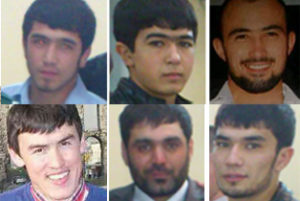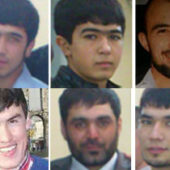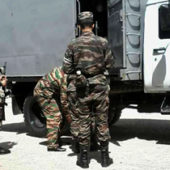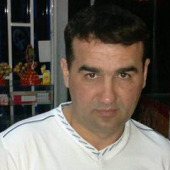27 September 2017
By Felix Corley, Forum 18
Another of the disappeared Muslim prisoners of conscience from Turkmenabad died in the summer in Ovadan-Depe top security prison. Aziz Gafurov’s body, returned to relatives, was «incredibly thin» and «blue from beatings». The authorities disappeared another Muslim prisoner of conscience, Annamurad Atdaev, possibly in Ovadan-Depe.
A third member of the large group of Muslims from Turkmenabad [Turkmenabat] (formerly Charjew) given long jail terms for meeting with others to discuss their faith is known to have died in the top-security Ovadan-Depe prison. The body of Aziz Gafurov – who was in his mid-thirties — was returned to relatives in his home village near Turkmenabad on 24 June. His thin body was covered in bruises, an eyewitness told Alternative Turkmenistan News.
Gafurov was one of dozens of Muslims imprisoned in 2013 and after to punish them for their involvement in a Muslim study group. Most or all the prisoners are believed to be held in Ovadan-Depe with no outsider being able to establish if they are still alive. Relatives often have no information as to whether they are still alive.
The disappearance of over 100 prisoners jailed for a variety of reasons from the early 1990s onwards, with their families being unable to find out whether they are alive or dead since their imprisonment, has been documented by the human rights defenders’ campaign Prove They Are Alive!
Forum 18 has been unable to establish whether Gafurov died of illness, starvation, neglect or torture. It failed to reach Ovadan-Depe Prison despite repeated calls on 27 September. A recorded message said the line was overloaded.
An official of the Penal Correction Department at the Interior Ministry in the capital Ashgabad [Ashgabat] – who would not give his name – initially claimed to Forum 18 on 27 September that Gafurov had died «a normal death». He then insisted that the Department had no information. Another official at the Department put the phone down as soon as Forum 18 asked about Gafurov’s death in Ovadan-Depe.
The United Nations (UN) Committee Against Torture has again criticised Turkmenistan over «consistent allegations of widespread torture and ill-treatment» and the government’s failure to stop and prevent such torture (see below).
Pirnazar Hudainazarov, now Chair of the Mejlis (Parliament) Human Rights Committee, was a member of Turkmenistan’s delegation at the UN Committee Against Torture hearings in Geneva in November 2016. His telephone went unanswered each time Forum 18 called on 27 September.
Another prisoner who has been disappeared – apparently in Ovadan-Depe – is 31-year-old Muslim Annamurad Atdaev. He was punished with a 15-year strict regime prison term after returning to Turkmenistan to renew his passport from Egypt, where he was studying Islam at Al-Azhar University (see below).
«I don’t know if my husband is even still alive,» Daria Atdaeva told Forum 18 on 27 September. «Even when prisoners die they often don’t hand over the body.»
UN Committee Against Torture criticises failures
The United Nations (UN) Committee Against Torture said in its Concluding Observations on Turkmenistan’s record (CAT/C/TKM/CO/2), adopted in December 2016, that it is «seriously concerned about consistent allegations of widespread torture and ill-treatment, including severe beatings, of persons deprived of their liberty, especially at the moment of apprehension and during pretrial detention, mainly in order to extract confessions. It is also gravely concerned about continued reports about impunity for acts of torture since no cases of torture have been recorded or examined by the State party’s courts during either the previous or the current reporting periods.»
The Committee added that it «remains deeply concerned about reports of deaths in custody owing to torture and about the State party’s failure to ensure independent forensic examinations of such deaths». The Committee «is particularly concerned by reports that numerous prisoners may have died as a result of conditions at Ovadan-Depe prison». It also expressed concern at «continued reports that an estimated 90 persons are being held by the State party in long-term incommunicado detention, a practice that amounts to enforced disappearance and violates the Convention».
The Committee reminded Turkmenistan that it has repeatedly called on the authorities to end torture, introduce reliable safeguards to prevent it and to punish the perpetrators.
The Committee noted that previously Turkmenistan «was called upon to ensure the provision, in practice, of safeguards against torture; provide access for international monitoring bodies, either governmental or non-governmental, to all detention facilities; permit visits to the country by the Special Rapporteur on torture and other cruel, inhuman or degrading treatment or punishment and the Working Group on Arbitrary Detention; inform the relatives of individuals detained incommunicado of their fate and whereabouts, and facilitate family visits; and ensure prompt, impartial and thorough investigations into all outstanding cases of alleged disappearances. Nonetheless, the Committee regrets that the State party has not implemented its recommendations.»
Long prison terms
The authorities arrested more than 100 Muslims in and around the eastern city of Turkmenabad who had participated in an informal Sunni Muslim study group led by Bahram Saparov. Saparov and 19 others were arrested in March 2013 and sentenced to long prison terms in May 2013 (for full list see F18News 23 January 2017 http://www.forum18.org/archive.php?article_id=2249).
All 20 of those sentenced are believed to have been eventually transferred to the isolated top-security prison at Ovadan-Depe (Picturesque Hill) in the Karakum desert 70 kms (45 miles) north of Ashgabad. Saparov and at least three more, and possibly all of the others, were imprisoned there in the blocks reserved for prisoners the authorities describe as «Wahhabis».
After the first group was tried and sentenced to long terms, further large groups were sentenced at closed trials. Aziz Gafurov, who was born in 1982, was among those believed to have been arrested and sentenced in late 2015.
Following his conviction, Gafurov was – like many of the other jailed members of the group – transported to the top-security Ovadan-Depe prison.
Two members of the first group of those sentenced died in Ovadan-Depe. Lukman Yaylanov died in summer 2016, possibly as a result of torture, and Narkuly Baltayev several months later. Both men were in their thirties.
«Aziz’s whole body was blue from beatings»
Following Gafurov’s death, the authorities returned his body to relatives in their home village of Urgenji near Turkmenabad on 24 June, Alternative Turkmenistan News noted. Officials forced Gafurov’s relatives to sign statements not to reveal anything about the condition of the body.
«Aziz’s whole body was blue from beatings,» a local resident who witnessed the body being washed before burial told Alternative Turkmenistan News for its 19 July article. «Indeed, it would be difficult to call it a body: it was incredibly thin with sagging skin.»
15-year prison term
Another prisoner of conscience punished for exercising freedom of religion or belief is Annamurad Nurmuhammedovich Atdaev (born 17 July 1986). On 13 December 2016, Ashgabad City Court sentenced him to a 15-year strict regime prison term, according to a 7 March 2017 letter from T. Allagulyyev, deputy head of the Court, seen by Forum 18.
Atdaev was convicted under Criminal Code Article 174, Part 1 («Conspiracy to seize power»); Article 175, Part 2 («Calls to violent change of the constitutional order»); Article 177, Part 1 («Inciting social, ethnic or religious hatred»); and Article 275, Part 1 («Creating an organised criminal group»). All these Articles carry punishments of long prison terms.
In the same letter, Allagulyyev declared that «the possibility of issuing the verdict is not given». He did not explain why not.
Atdaev was denied a lawyer of his choice and was given only a state lawyer. «My husband denied any guilt,» Daria Atdaeva told Forum 18 on 27 September.
Atdaev’s one-day trial was closed, Vitaly Ponomarev of the Russian human rights group Memorial noted on 15 May. Relatives who found out about the trial tried to attend, but were denied entry to the court.
Relatives took on their own lawyer after the first trial to prepare an appeal on Atdaev’s behalf. However, the lawyer failed to submit an appeal.
In late January 2017, Atdaev was transported to the prison in Tejen in Ahal Region to the south-east of Ashgabad. His relatives were told he would spend two weeks in «quarantine», the isolation period when a prisoner is transferred to a new prison. When relatives tried to visit him at the end of this period the prison head told them verbally that after two days in the prison Atdaev had been transferred to the top-security prison at Ovadan-Depe on orders from Ashgabad.
Since then relatives have not been able to submit parcels for Atdaev. At the reception centre in Ashgabad, officials told relatives in summer 2017 that his name is not on the list of Ovadan-Depe’s prisoners. Relatives have been allowed no meetings or correspondence with Atdaev since he was sentenced.
Why was Atdaev jailed?
In 2008 Atdaev began legal studies at Grodno State University in Belarus. It was there he became interested in Islam and started to pray the namaz regularly. He then decided to abandon his legal studies and prepare to enter Al-Azhar University in Cairo to study Islam. After Arabic studies he entered the university.
While in Egypt he married a Russian convert to Islam, Daria, and they have two young children.
In 2013 Russian television showed a former Turkmen student of Al-Azhar who had travelled to fight against the government in Syria. «We found out about this from Russian television,» Daria Atdaeva told Ponomarev of Memorial.
As Atdaev had an old-style Turkmen passport whose validity was annulled when new passports were introduced, he was required to return to Turkmenistan which he had not visited since 2008.
As soon as Atdaev landed in Ashgabad Airport in March 2016, he was detained for questioning. The Ministry of State Security (MSS) secret police questioned him for several hours. As soon as he was released and reached his relatives’ home he shaved off his beard and bought a packet of cigarettes to put in his pocket, hoping to avoid accusations of «Wahhabism».
The MSS secret police summoned Atdaev for questioning lasting about six hours at a time about his fellow Turkmen students in Cairo. They appeared well informed about his life there, including over the layout of the family’s flat. They asked him to become an informer for them about Muslims in Ashgabad, but he refused.
Police arrested Atdaev on 27 September 2016 at his place of work. He was initially sentenced to 15 days’ imprisonment, apparently for «hooliganism». Two new 15-day sentences were then handed down. At the end of the third 15-day term investigators launched the criminal case against him.
The lawyer engaged by relatives after the trial told them that Atdaev had been punished for anti-government remarks he had made during festivities for the end of Ramadan in Ashgabad in July 2016. Relatives insist that the claims that he made such remarks came from informers to the MSS secret police.
Appeals for Atdaev
Atdaev’s wife Daria, a Russian citizen who is based in Egypt with their two young children, pledged to continue campaigning for her husband, whom she has not seen since his return to Turkmenistan in March 2016. «I’ll do everything to try to find out if my husband is still alive, if he is being fed properly, to try to ensure that he is not being beaten,» she told Forum 18.
She appealed to the Russian Foreign Ministry for help in identifying where Atdaev was being held and seeking visits to him in prison. However, the Foreign Ministry referred the enquiry to Russia’s Embassy in Ashgabad.
On 20 June, in a letter seen by Forum 18, the head of the Embassy’s Consular Service, Vitaly German, wrote back to her merely informing her that Turkmenistan’s «competent organs» said that her husband «is being held in places of deprivation of freedom in Turkmenistan» in accordance with the Ashgabad City Court decision.
An appeal was also sent on Atdaev’s behalf in late April to the UN Working Group on Enforced or Involuntary Disappearances in Geneva. «On 27 April 2017, the Working Group transmitted, under its urgent action procedure, a case to the Government of Turkmenistan concerning Annamurad Atdaev, allegedly disappeared in late January 2017 from the penal colony in Tedzhen, Ahal Province, Turkmenistan,» the Working Group noted in its report of its May session in Geneva (A/HRC/WGEID/112/1).





